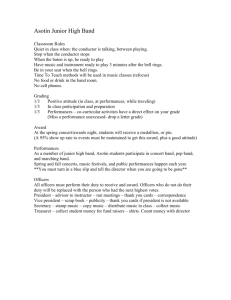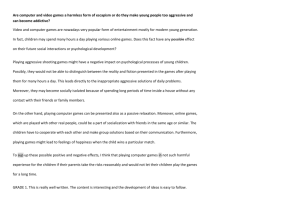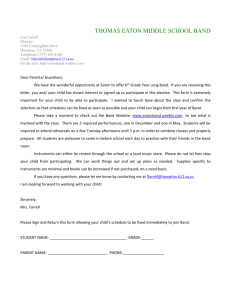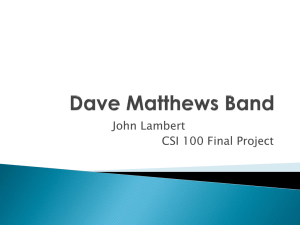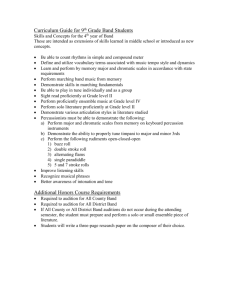7th Grade Band Syllabus
advertisement
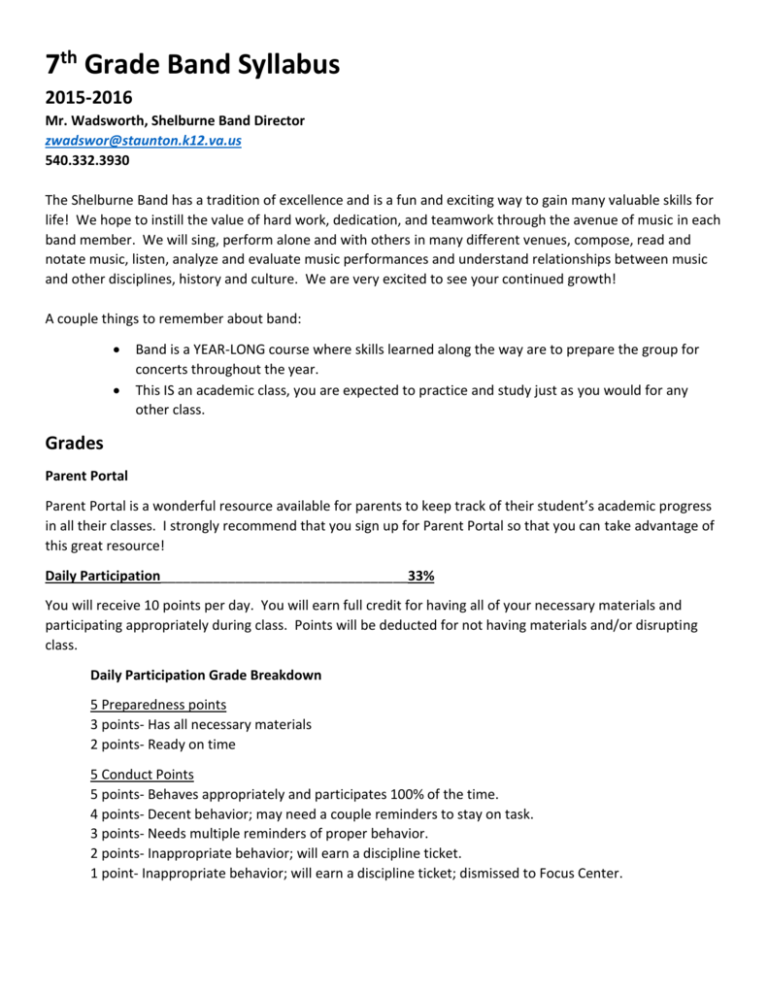
7th Grade Band Syllabus 2015-2016 Mr. Wadsworth, Shelburne Band Director zwadswor@staunton.k12.va.us 540.332.3930 The Shelburne Band has a tradition of excellence and is a fun and exciting way to gain many valuable skills for life! We hope to instill the value of hard work, dedication, and teamwork through the avenue of music in each band member. We will sing, perform alone and with others in many different venues, compose, read and notate music, listen, analyze and evaluate music performances and understand relationships between music and other disciplines, history and culture. We are very excited to see your continued growth! A couple things to remember about band: Band is a YEAR-LONG course where skills learned along the way are to prepare the group for concerts throughout the year. This IS an academic class, you are expected to practice and study just as you would for any other class. Grades Parent Portal Parent Portal is a wonderful resource available for parents to keep track of their student’s academic progress in all their classes. I strongly recommend that you sign up for Parent Portal so that you can take advantage of this great resource! Daily Participation_________________________________33% You will receive 10 points per day. You will earn full credit for having all of your necessary materials and participating appropriately during class. Points will be deducted for not having materials and/or disrupting class. Daily Participation Grade Breakdown 5 Preparedness points 3 points- Has all necessary materials 2 points- Ready on time 5 Conduct Points 5 points- Behaves appropriately and participates 100% of the time. 4 points- Decent behavior; may need a couple reminders to stay on task. 3 points- Needs multiple reminders of proper behavior. 2 points- Inappropriate behavior; will earn a discipline ticket. 1 point- Inappropriate behavior; will earn a discipline ticket; dismissed to Focus Center. Playing or Written Quizzes and Assignments____________33% There will be a multitude of assessments throughout the year. There will be a playing or written quiz every week. Assessments will be on scales, rhythms, sight reading, music vocabulary, music history, repertoire for performances (possibly), and other musical concepts. A list of the year’s assessments can be found below. Concerts_________________________________________34% PERFORMANCES ARE MANDATORY SO PLEASE HAVE THE DATES IN YOUR CALENDAR. You are expected to be at all performances. As band is a “performance group,” it is necessary that all participants rehearse and perform with the ensemble. If there are extenuating circumstances, such as a planned vacation, you need to let me know 2 weeks prior to the concert. If you must miss a concert you will need to meet with Mr. Wadsworth to agree on a suitable make-up assignment/performance. It is also expected that all band members STAY for the entire concert. Homework Policy There will be little to no written homework for 7th grade band, but students are expected to practice regularly for playing assessments and mastering their individual parts in group repertoire. We will also be having multiple written assessments throughout the year and students are expected to study in preparation for those. Course Objectives By the end of your 7th grade year you will be able to say, “I Can…” Echo, read, and notate music, including identifying, defining, and using standard notation for pitch, rhythm, meter, articulation, dynamics, and singing independent parts selected from the music being studied. (MII.1) Echo, read, and perform rhythms and rhythmic patterns, including sixteenth notes, eighth-note triplets, dotted eighth notes, corresponding rests, and syncopations. (MII.2) Identify, read, and perform music in 2/2 (cut time) and 6/8 meters. (MII.3) Identify and notate key signatures of scales and literature being performed. (MII.4) Read, perform, and notate scales, including ascending and descending concert C, G, and D major scales; a G harmonic minor scale; a chromatic scale. (MII.5) Identify and perform music written in rondo and ternary forms. (MII.6) Use music composition as a means of expression by 1) composing a four-measure rhythmic-melodic variation and 2) notating the composition in standard notation using contemporary technology. (MII.7) Define and apply music terminology found in the music literature being studied. (MII.8) Demonstrate preparatory playing procedures, including 1) care and basic maintenance of the instrument, 2) consistent use of proper playing posture, instrument position, and hand positions, 3) basic tuning of the instrument with and without an electronic tuner, 4) consistent use of proper embouchure (wind player), and 5) stick grip for snare drum and mallets; basic tuning of two timpani; setup of timpani; mallet instruments; and auxiliary instruments (percussion player). (MII.9) Demonstrate proper instrumental techniques, including 1) adjusting and perfecting intonation while playing, 2) producing tones that are clear, free of tension, sustained, and unwavering in pitch, 3) proper breathing techniques and embouchure, contrasting articulations (wind player), and 4) 9 stroke roll, drag, drag paradiddle, flam accent, flamacue, single drag tap, and Lesson 25, open-close-open on snare drum; playing techniques on timpani, mallet, and auxiliary instruments, including single-stroke roll (percussion player). (MII.10) Demonstrate ensemble skills at an intermediate level, including 1) balancing and blending instrumental timbres, 2) making adjustments to facilitate correct intonation, 3) matching dynamic levels and playing style, 4) responding to conducting patterns and gestures, and 5) maintaining a steady beat at various tempos in the music literature being studied. (MII.11) Read and interpret standard music notation while performing music of varying styles and levels of difficulty. (MII.12) Demonstrate use of articulations, dynamic contrasts, and phrasing as means of expression. (MII.13) Perform simple rhythmic and melodic examples in call-and-response styles. (MII.14) Demonstrate musicianship and personal engagement by 1) making adjustments to facilitate correct intonation, 2) identifying and producing the characteristic sound of the instrument being studied, 3) monitoring individual practice with a level of refinement that reflects specific musical goals, 4) participating in curricular and co-curricular school performances and local, district, or regional events, as appropriate to level, ability, and interest, and 5) describing and demonstrating rehearsal and concert etiquette as a performer. (MII.16) Sight-read music of varying styles and levels of difficulty. (MII.17) Explore historical and cultural aspects of music by 1) describing the cultures, musical styles, composers, and historical periods associated with the music literature being studied, 2) comparing and contrasting a variety of musical styles, using music terminology, 3) comparing and contrasting the functions of instrumental music in a variety of cultures, 4) comparing and contrasting career options in music, 5) relating instrumental music to the other fine arts, and 6) consistently demonstrating concert etiquette as an active listener. (MII.18) Analyze and evaluate music by 1) explaining the importance of cultural influences and historical context for the interpretation of works of music, 2) interpreting works of music, using inquiry skills and music terminology, 3) applying accepted criteria for analyzing and evaluating works of music, 4) describing performances of music using music terminology, and 5) applying accepted criteria for critiquing musical performances of self and others. (MII.19) Investigate aesthetic concepts related to music by 1) describing personal responses to works of music using music terminology, 2) analyzing ways in which music can evoke emotion and be persuasive, 3) applying aesthetic criteria for determining the quality of a work of music or importance of a musical style. (MII.20) Performance Schedule October 25th, 6:00pm- Halloween Concert @ Shelburne Middle School December 5th- District Band Auditions @ Turner Ashby High School December 10th/11th- Possible Woodwind Ensemble Trip (Date subject to change) December 13th, 7:00pm- 7th/8th Grade Winter Band Concert February 5th and 6th- All District Band @ Robert E. Lee High School March 4th- District Assessment @ Skyline Middle School April 10th, 5:00pm- Band Banquet @ Shelburne Middle School May 1st, 5:00pm- Spring Band Concert @ Robert E. Lee High School Jazz Band The Jazz Band will rehearse every Monday and Thursday starting on November 2nd and is open to all 7th and 8th graders. The group performs at the Winter Concert, Band Banquet, the Spring Concert, and Jazz in the Park (date TBD). Members will also have the opportunity to audition to participate in the All-District Jazz Band (dates TBD). Woodwind Ensemble The Woodwind Ensemble is open to all 7th and 8th grade woodwind players (including saxophones and oboes)! The group rehearses every Wednesday starting September 30th to prepare for a day of performances at McSwain, A.R. Ware, and Bessie Weller Elementary Schools as well as a special performance at the Augusta Health Center. Required Materials 1” Band Binder with 4 Dividers labeled (Info, Warmups, Theory, Music) Essential Elements 2000 Book 1 (only for 1st 9 weeks) Pencil Planner Flute: Cleaning rod and cloth. Reed Instruments: Cork grease, cleaning kit, at least 3 good reeds at all times (Vandoren 2’s). Oboe: Jones Medium soft reeds (3 good reeds at all times) Brass: Valve/slide oil, slide grease. Tuba/Euphonium/French Horns: Draw string bag or gallon zip lock bag, mouthpieces. Percussion: Drum sticks, bell mallets (should be included in percussion kit). **Suggested Material (for home practice): Metronome, tuner, music stand Assessments 1st 9 Weeks: Proper Band Room Procedures and Guidelines (written) Music Vocabulary #1 (written) Bb Scale (written) Bb Scale (playing) Rhythm #1 (written) Sight Reading #1 (playing) Music History: 32,000 BC to Ancient Greece (written) Eb Scale (written) Eb Scale (playing) 2nd 9 Weeks: Music Vocabulary #2 (written) Rhythm #2 (written) Sight Reading #2 (playing) F Scale (written) F Scale (playing) Music History: Early Christianity (written) C Scale (written) C Scale (playing) Notes on the piano (written) Chromatic Scale #1: Octave and a Fifth (playing) 3rd 9 Weeks: Music Vocabulary #3 (written) Rhythm #3 (written) Sight Reading #3 (playing) G Scale (written) G Scale (playing) Music History: Advances in Rhythm and Harmony (written) Rhythm #4 (written) Ab Scale (written) Ab Scale (playing) 4th 9 Weeks: Music Vocabulary #4 (written) Sight Reading #4 (playing) Music History: Innovation through the 16th Century (written) Db Scale (written) Db Scale (playing) Rhythm #5 (written) Sight Reading #5 (playing) Chromatic Scale #2: Full MS Instrument Range (playing) Music History: Reformation (written) I have read and understand the 7th Grade Band Syllabus! Student Name__________________________ Date__________ Parent Signature_____________________________
